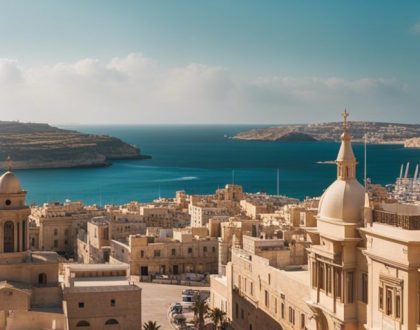Banking in Malta – A Guide for Beginners

Banking in Malta can be a smooth and efficient process when done correctly. As a beginner navigating the financial landscape of a new country, it’s crucial to be well-informed about the banking system to ensure your money is safe and secure. Understanding the ins and outs of Malta’sbanking regulations, fees, and services will help you make informed decisions for your financial future.
Types of Banks in Malta
The banking sector in Malta is diverse, offering a range of financial services to cater to the needs of individuals and businesses. Understanding the types of banks in Malta is crucial for anyone looking to manage their finances effectively in the country.
- Commercial Banks: These are the most common type of banks in Malta, offering a wide range of services such as current accounts, savings accounts, loans, mortgages, and more.
- Investment Banks: These banks focus on providing services related to investment opportunities, mergers and acquisitions, and capital raising for businesses.
- Specialized Banking Institutions: These banks cater to specific niches such as Islamic banking, private banking, or corporate banking.
Commercial Banks and Their Services
Services: Commercial banks in Malta offer a wide range of financial services to individuals and businesses. These include but are not limited to current accounts, savings accounts, personal loans, mortgages, credit cards, and online banking facilities. They also provide services such as foreign currency exchange, investment products, and wealth management.
Perceiving commercial banks as the go-to for everyday banking needs is common among Maltese residents and businesses. They are known for their reliability, convenience, and accessibility, making them a popular choice for many.
Investment Banks: What They Do
Any company looking to raise capital, acquire another business, or explore investment opportunities can benefit from the services of investment banks in Malta. These banks specialize in providing financial advice, underwriting securities, and facilitating mergers and acquisitions. They play a crucial role in the financial markets, assisting businesses in their growth and expansion strategies.
Specialized Banking Institutions
Commercial banks may not always cater to the specific needs of every individual or business. That’s where specialized banking institutions come in. These banks focus on niche areas such as Islamic banking, catering to clients who require specialized financial products and services tailored to their beliefs and preferences.
Opening a Bank Account: A Step-by-Step Guide
Now let’s take a closer look at the process of opening a bank account in Malta. This step-by-step guide will help you navigate through the requirements and ensure a smooth experience.
| Eligibility and Documentation Required | Choosing the Right Bank and Account Type for Your Needs |
Eligibility and Documentation RequiredThere’s certain criteria you need to meet to open a bank account in Malta. To be eligible, you typically need to be at least 18 years old, provide proof of identity (such as a passport or ID card), and show proof of residency in Malta. Additionally, some banks may require proof of income or employment. Documentation required may include a proof of address, which can be a utility bill or a rental agreement, and a reference letter from your current bank to confirm your banking history. It’s important to have all these documents in order to comply with the bank’s regulations. | Choosing the Right Bank and Account Type for Your NeedsWhen opening a bank account, it’s crucial to consider your banking needs. Different banks offer various account types, from basic savings accounts to specialized accounts for students or expatriates. Take into account factors such as fees, interest rates, online banking facilities, and customer service when making your decision. |
Account maintenance fees and requirements may vary between banks, so be sure to inquire about these details before making your final choice. Some banks may offer additional perks such as rewards programs or discounts with specific merchants, so it’s worth exploring all your options to find the best fit for your financial needs.
Online Banking in Malta
How to Set Up and Use Online Banking
Banking in Malta has evolved with the digital age, offering convenient online banking services to residents and expats. Setting up online banking in Malta is a straightforward process. You can typically register for online banking through your bank’s website or by visiting a branch in person. Once you have set up your online banking account, you can access it using your login credentials and start managing your finances from the comfort of your home.
Security Tips for Safe Online Banking
For a safe online banking experience in Malta, it’s crucial to prioritize security measures. Be sure to choose a strong, unique password for your online banking account and avoid sharing it with anyone. Enable two-factor authentication if your bank offers this feature to add an extra layer of security to your account. Regularly monitor your account for any unauthorized transactions and report any suspicious activity to your bank immediately.
- Choose a strong password and keep it confidential
- Enable two-factor authentication for added security
- Monitor your account regularly for any suspicious activity
- Knowing the importance of keeping your login credentials secure is key to safeguarding your online banking transactions.
Factors to Consider When Banking in Malta
For individuals looking to establish a banking relationship in Malta, it is important to consider a few key factors to ensure a smooth and secure banking experience. By understanding the regulatory environment, financial health of Maltese banks, and other important aspects, you can make well-informed decisions about where to bank in Malta.
Understanding the Regulatory Environment
Banking in Malta is governed by the Malta Financial Services Authority (MFSA), which serves as the regulatory body overseeing all financial institutions in the country. The MFSA ensures that banks comply with regulations to safeguard the interests of customers and maintain the stability of the financial system. Additionally, Malta is a member of the European Union, which means that banks in Malta must adhere to EU banking regulations and standards.
Recognizing the importance of the regulatory environment can help you feel confident in the safety and security of your funds when banking in Malta.
Evaluating the Financial Health of Maltese Banks
Little is known about evaluating the financial health of Maltese banks, but it is crucial information to consider when choosing a bank. Understanding the financial stability and performance of a bank can give insight into its ability to weather economic downturns and protect your deposits. For instance, you may want to look at factors such as the bank’s capital adequacy ratio, profitability, and asset quality to gauge its financial health.
For individuals seeking long-term financial stability, evaluating the financial health of Maltese banks is crucial to making informed decisions about where to bank.
Pros and Cons of Banking in Malta
After deciding to bank in Malta, it’s imperative to weigh the pros and cons to make an informed decision. Here, we break down the advantages and potential drawbacks of banking in Malta.
Advantages of the Maltese Banking System
System
Malta’s banking system offers stability and security to depositors. With a strong regulatory framework in place, Maltese banks provide a safe environment for individuals and businesses to manage their finances. Additionally, the country’s membership in the European Union ensures that its financial institutions adhere to high standards of compliance and transparency.
Moreover, Malta’s strategic location in the Mediterranean makes it a gateway for international banking activities. This can be beneficial for individuals looking to access investment opportunities or engage in cross-border financial transactions.
Potential Drawbacks and How to Mitigate Them
Cons
One potential drawback of banking in Malta is the risk associated with exposure to the Eurozone. Economic instability in other Eurozone countries can impact Malta’s economy and financial sector. To mitigate this risk, it’s imperative for depositors to diversify their assets and consider investing in stable currencies or assets outside the Eurozone.
Tips for Foreigners Using the Maltese Banking System
Not familiar with the Maltese banking system? Here are some vital tips to help you navigate the waters smoothly. Whether you’re a student, expat, or digital nomad, understanding how to manage your finances in Malta is vital for a hassle-free experience.
Navigating Currency Exchange and International Transfers
Banking in Malta involves currency exchange and international transfers, especially if you’re a foreigner. When transferring money to and from Malta, consider using reputable services or banks to avoid high fees and unfavorable exchange rates. It’s crucial to research the best options available to you, such as online transfer platforms or local banks that offer competitive rates for international transactions.
Any fluctuations in currency exchange rates can impact the amount you receive or send, so stay informed and plan your transfers wisely. With the right approach, you can save time and money while handling your finances with ease.
How to Avoid Common Banking Mistakes in Malta
Assuming that banking processes in Malta are similar to your home country can lead to costly mistakes. It’s vital to familiarize yourself with the local regulations, fees, and banking practices to avoid any surprises. While Malta’s banking system is user-friendly, overlooking important details can result in delays or unforeseen charges.
Currency fluctuations can affect your savings or expenses, so monitor exchange rates regularly to make informed decisions. Additionally, seek advice from financial experts or expats who have experience with the Maltese banking system to optimize your financial management strategies.
Summing up
With this in mind, it is important for beginners to understand the basics of banking in Malta, including the types of accounts available, the services offered by banks, and the regulatory framework governing the industry. By familiarizing themselves with these key aspects, individuals can make more informed decisions when it comes to managing their finances and choosing the right bank for their needs.
Overall, banking in Malta offers a secure and reliable financial environment for both residents and non-residents alike. By following the guidelines outlined in this guide, beginners can navigate the banking landscape in Malta with confidence and ease, ensuring that their money is well-protected and their financial goals are within reach.
Recommended Posts

Malta’s Coastal Drives for Road Trippers
May 17, 2024

Malta’s iGaming Frontier – Best Brands
May 17, 2024

How to Start Your Malta Business Journey
May 17, 2024




